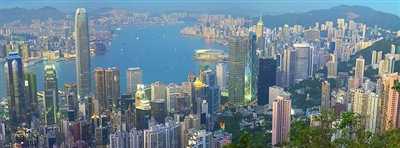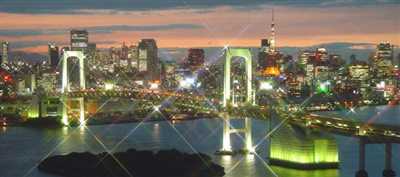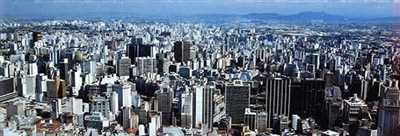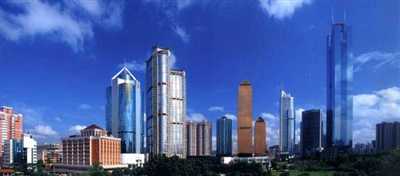1. Hong Kong, China
Metro/Urban Population: 6.8 million

Hong Kong is number one on my list for many reasons: Hong Kong has whopping 39 buildings over 200 meters tall. It also boasts four of the 15 tallest buildings in the world... that's all in one city! Hong Kong's skyline shows a large selection of distinct sky-reaching towers, with beautiful night lighting and reflection. This city exemplifies the post-modern skyscraper and skyline. Finally, the mountain backdrop makes this skyline (as you can clearly see) the greatest on the planet!
2. Chicago , USA
Metro/Urban Population: 8.5 million

Chicago is the birthplace of the modern skyscraper. When Chicago built its first steel high-rise in 1885, it was not the tallest structure in the world but the first example of a new form of engineering that would change nearly every city on earth. Chicago has 17 buildings over 200 meters tall (three of which are among the top 20 tallest buildings in the world, including the tallest in North America). Chicago has some of the finest mid-century architecture and examples of modern skyscrapers.
3. Shanghai , China
Metro/Urban Population: 13.1 million

Not to be mistaken for a space station, Shanghai is a real city! China's biggest and most advanced city, Shanghai was said to be the most cosmopolitan city in the beginning of the 20th century, but lost its glory during the "Mao era". It is now quickly regaining its position as one of the biggest economic powerhouses in the world as well as a showcase of modern architecture. In Shanghai you'll find 18 structures that are over 200 meters tall, one of which is the insanely tall, the 468m downtown Oriental Pearl TV Tower.
4. New York City , USA
Metro/Urban Population: 21.0 million

New York City has one of the densest and most diverse skylines, with a huge collection of buildings and building styles. Thanks to Hollywood's obsession with the city, it is also the most easily recognizable skyline in the world. New York City has an amazing 44 buildings over 200 meters - the most in the world! Home of the famous, now destroyed World Trade Center Towers , the Empire State building, the Statue of Liberty and the United Nations, New York City is the financial capital of the western world. Upon the completion of the new "Freedom Tower " (built on the old site of the World Trade Centers), it may rank higher in this list (depending on how good it looks of course).
5. Tokyo , Japan
Metro/Urban Population: 32.0 million

Tokyo is the world's most populated city. Its skyline has a number of unique characteristics that set it apart from other big city skylines, among them 15 structures at over 200 meters tall (including the Tokyo Tower which changes colors every night). But because of the density and vast size of the city, every corner appears to have its own skyline. With the height restrictions and the required red lights that flash atop all mid to tall-sized buildings make the city look spectacular at night. Tokyo is filled with neon lighting and unique, contemporary architecture, and like New York City is also often portrayed in movies for its aesthetic and eye-catching cityscapes. Interesting fact: Tokyo houses the world's largest fleet of helicopters to get around town if traffic gets too crazy.
6. Singapore , Singapore
Metro/Urban Population: 3.8 million

One of the best (urban) planned and cleanliest metropolitan cities in the world, Singapore looks like an architectural model city come to life. The buildings cannot be higher than 280 meters due to air traffic control restrictions, but that has added a tall (but not too tall) and consistent building height and space pattern that makes this skyline unique: Three buildings are exactly 280 meters tall and 5 others (8 total) stand at just over 200 metres. The buildings are mostly light-coloured and there is a large expanse of greenery dotted around the city core. This South-Eastern city is definitely in a league of its own.
7. Toronto , Canada
Metro/Urban Population: 5.1 million

Toronto is a meeting place, a crossroads of many cultures and ethnicities. Toronto is downtown Canada, the biggest city in the country with a skyline to match. Toronto has 7 structures in its skyline that stand at over 200 metres, including the astonishingly tall 553 metres, CN Tower, which is often referred to as the tallest freestanding structure in the world. While mostly untrue (because there are taller TV masts in the world), the CN Tower possesses the world's highest observation deck, making this city's skyline one of the most immediately identifiable.
8. Kuala Lumpur , Malaysia
Metro/Urban Population: 1.5 million

This is probably the most impressive city worldwide that has less than 2 million residents. Marvelous modern buildings reach the sky here, and while the skyline is not too dense, it does allow buildings to soar and stand out. Kuala Lumpur has three of the 25 tallest buildings worldwide, including the tallest twin buildings, the Petronas Towers (which are arguably the second and third tallest overall in the world) as well as the 420 meters Menara Kuala Lumpur Tower.
9. Shenzhen, China
Metro/Urban Population: 4.2 million

What was a tiny fishing village on the border of Hong Kong in 1970 is now a buzzing metropolis of over four million people. With 13 buildings at over 200 meters tall, including the Shun Hing Square (the 8th tallest building in the world), Shenzen is a marvel of lights after sunset. You can't help but ask yourself if you are in a video game or in a real city.
10. Seoul, South Korea
Metro/Urban Population: 20.8 million

This city's skyscrapers are divided into many clusters, spread amongst the main businesses and residential districts. Most of the recent growth in Seoul's skyline, however, has been of residential towers over 60 storeys high that are shooting up like blades of grass! There are 10 buildings in Seoul over 200 meters tall and much of the mid-rise to high-rise structures are lined up in a linear fashion, creating a "wall" of buildings like no other. Seoul is where the ancient Eastern world meets the modern West.
11. Sao Paolo , Brazil
Metro/Urban Population: 18.3 million

"What building did you say they lived in?" Finding it in the largest mass of condensed apartment buildings anywhere would be like finding a needle in a haystack. Sao Paolo has a population of over 18 million people! While the buildings are not super tall (with only a single structure at over 200 meters tall) this skyline is nevertheless stacked. Sao Paolo has a fleet of over 500 helicopters, the second largest helicopter fleet in the world.
12. Sydney , Australia
Metro/Urban Population: 4.2 million

Australia's showcase city, Sydney has one of the most recognizable skylines due to its world-famous harbour, often referred to as the most beautiful natural harbour in the world. The Sydney Harbour has many bays, inlets and secondary harbours. It is spanned by the monumental Harbour Bridge , and the Opera House decorates the shoreline like a white flower. The Sydney skyline is world-class with hundreds of skyscrapers in the central business district and many more high-rise buildings in the outlying neighbourhoods. Sydney has 8 buildings over 200 meters tall.
13. Frankfurt , Germany
Metro/Urban Population: 4.1 million

Certainly one of Europe's most interesting cities in terms of skylines, Frankfurt is home to five structures that are over 200 meters tall. These modern skyscrapers are marvels compared to those other, mostly non-existent ones scattered across European cities. The contrast here is interesting: The city combines low-rise, high-density traditional European architecture (some of which is over 1,000 years old), with modern towers that stick out like sore thumbs, but are impressive nonetheless.
14. Dubai , United Arab, Emirates
Metro/Urban Population: 1.6 million

Is this a mirage in the Middle East? Seemingly out of nowhere emerges a city in the middle of a desert. This is Dubai, a city that produces only the best modern architecture in the world. Already home of the world's tallest all-hotel building and the tallest all-residential building in the world, AND currently proposed to build the world's tallest building, this skyline might just leap to the number 1 spot in the near future. While the skyline is not so dense, each building is a marvel all on its own. As a skyline it probably can't compete with the larger cities, however the individual buildings in this city are by far the greatest examples of modern architectural accomplishments. All seven structures in this city at over 200 meters tall were built in 1999 or later ! - that's how new this city is.
15. Guangzhou , China
Metro/Urban Population: 4.1 million

Guangzhou is the Chinese name for both the province and its capital city, both of which the English called 'Canton'. This province is the closest to Hong Kong and the language spoken here (Cantonese) is the one is spoken by the many thousands of Hong Kong immigrants to North America, (vs Mandarin, the language spoken in Beijing. (Cantonese and Mandarin are as different from each other as English is from French, but both groups can read the written Chinese characters since both use the same pictographs to represent the same ideas)
Metro/Urban Population: 6.8 million

Hong Kong is number one on my list for many reasons: Hong Kong has whopping 39 buildings over 200 meters tall. It also boasts four of the 15 tallest buildings in the world... that's all in one city! Hong Kong's skyline shows a large selection of distinct sky-reaching towers, with beautiful night lighting and reflection. This city exemplifies the post-modern skyscraper and skyline. Finally, the mountain backdrop makes this skyline (as you can clearly see) the greatest on the planet!
2. Chicago , USA
Metro/Urban Population: 8.5 million

Chicago is the birthplace of the modern skyscraper. When Chicago built its first steel high-rise in 1885, it was not the tallest structure in the world but the first example of a new form of engineering that would change nearly every city on earth. Chicago has 17 buildings over 200 meters tall (three of which are among the top 20 tallest buildings in the world, including the tallest in North America). Chicago has some of the finest mid-century architecture and examples of modern skyscrapers.
3. Shanghai , China
Metro/Urban Population: 13.1 million

Not to be mistaken for a space station, Shanghai is a real city! China's biggest and most advanced city, Shanghai was said to be the most cosmopolitan city in the beginning of the 20th century, but lost its glory during the "Mao era". It is now quickly regaining its position as one of the biggest economic powerhouses in the world as well as a showcase of modern architecture. In Shanghai you'll find 18 structures that are over 200 meters tall, one of which is the insanely tall, the 468m downtown Oriental Pearl TV Tower.
4. New York City , USA
Metro/Urban Population: 21.0 million

New York City has one of the densest and most diverse skylines, with a huge collection of buildings and building styles. Thanks to Hollywood's obsession with the city, it is also the most easily recognizable skyline in the world. New York City has an amazing 44 buildings over 200 meters - the most in the world! Home of the famous, now destroyed World Trade Center Towers , the Empire State building, the Statue of Liberty and the United Nations, New York City is the financial capital of the western world. Upon the completion of the new "Freedom Tower " (built on the old site of the World Trade Centers), it may rank higher in this list (depending on how good it looks of course).
5. Tokyo , Japan
Metro/Urban Population: 32.0 million

Tokyo is the world's most populated city. Its skyline has a number of unique characteristics that set it apart from other big city skylines, among them 15 structures at over 200 meters tall (including the Tokyo Tower which changes colors every night). But because of the density and vast size of the city, every corner appears to have its own skyline. With the height restrictions and the required red lights that flash atop all mid to tall-sized buildings make the city look spectacular at night. Tokyo is filled with neon lighting and unique, contemporary architecture, and like New York City is also often portrayed in movies for its aesthetic and eye-catching cityscapes. Interesting fact: Tokyo houses the world's largest fleet of helicopters to get around town if traffic gets too crazy.
6. Singapore , Singapore
Metro/Urban Population: 3.8 million

One of the best (urban) planned and cleanliest metropolitan cities in the world, Singapore looks like an architectural model city come to life. The buildings cannot be higher than 280 meters due to air traffic control restrictions, but that has added a tall (but not too tall) and consistent building height and space pattern that makes this skyline unique: Three buildings are exactly 280 meters tall and 5 others (8 total) stand at just over 200 metres. The buildings are mostly light-coloured and there is a large expanse of greenery dotted around the city core. This South-Eastern city is definitely in a league of its own.
7. Toronto , Canada
Metro/Urban Population: 5.1 million

Toronto is a meeting place, a crossroads of many cultures and ethnicities. Toronto is downtown Canada, the biggest city in the country with a skyline to match. Toronto has 7 structures in its skyline that stand at over 200 metres, including the astonishingly tall 553 metres, CN Tower, which is often referred to as the tallest freestanding structure in the world. While mostly untrue (because there are taller TV masts in the world), the CN Tower possesses the world's highest observation deck, making this city's skyline one of the most immediately identifiable.
8. Kuala Lumpur , Malaysia
Metro/Urban Population: 1.5 million

This is probably the most impressive city worldwide that has less than 2 million residents. Marvelous modern buildings reach the sky here, and while the skyline is not too dense, it does allow buildings to soar and stand out. Kuala Lumpur has three of the 25 tallest buildings worldwide, including the tallest twin buildings, the Petronas Towers (which are arguably the second and third tallest overall in the world) as well as the 420 meters Menara Kuala Lumpur Tower.
9. Shenzhen, China
Metro/Urban Population: 4.2 million

What was a tiny fishing village on the border of Hong Kong in 1970 is now a buzzing metropolis of over four million people. With 13 buildings at over 200 meters tall, including the Shun Hing Square (the 8th tallest building in the world), Shenzen is a marvel of lights after sunset. You can't help but ask yourself if you are in a video game or in a real city.
10. Seoul, South Korea
Metro/Urban Population: 20.8 million

This city's skyscrapers are divided into many clusters, spread amongst the main businesses and residential districts. Most of the recent growth in Seoul's skyline, however, has been of residential towers over 60 storeys high that are shooting up like blades of grass! There are 10 buildings in Seoul over 200 meters tall and much of the mid-rise to high-rise structures are lined up in a linear fashion, creating a "wall" of buildings like no other. Seoul is where the ancient Eastern world meets the modern West.
11. Sao Paolo , Brazil
Metro/Urban Population: 18.3 million

"What building did you say they lived in?" Finding it in the largest mass of condensed apartment buildings anywhere would be like finding a needle in a haystack. Sao Paolo has a population of over 18 million people! While the buildings are not super tall (with only a single structure at over 200 meters tall) this skyline is nevertheless stacked. Sao Paolo has a fleet of over 500 helicopters, the second largest helicopter fleet in the world.
12. Sydney , Australia
Metro/Urban Population: 4.2 million

Australia's showcase city, Sydney has one of the most recognizable skylines due to its world-famous harbour, often referred to as the most beautiful natural harbour in the world. The Sydney Harbour has many bays, inlets and secondary harbours. It is spanned by the monumental Harbour Bridge , and the Opera House decorates the shoreline like a white flower. The Sydney skyline is world-class with hundreds of skyscrapers in the central business district and many more high-rise buildings in the outlying neighbourhoods. Sydney has 8 buildings over 200 meters tall.
13. Frankfurt , Germany
Metro/Urban Population: 4.1 million

Certainly one of Europe's most interesting cities in terms of skylines, Frankfurt is home to five structures that are over 200 meters tall. These modern skyscrapers are marvels compared to those other, mostly non-existent ones scattered across European cities. The contrast here is interesting: The city combines low-rise, high-density traditional European architecture (some of which is over 1,000 years old), with modern towers that stick out like sore thumbs, but are impressive nonetheless.
14. Dubai , United Arab, Emirates
Metro/Urban Population: 1.6 million

Is this a mirage in the Middle East? Seemingly out of nowhere emerges a city in the middle of a desert. This is Dubai, a city that produces only the best modern architecture in the world. Already home of the world's tallest all-hotel building and the tallest all-residential building in the world, AND currently proposed to build the world's tallest building, this skyline might just leap to the number 1 spot in the near future. While the skyline is not so dense, each building is a marvel all on its own. As a skyline it probably can't compete with the larger cities, however the individual buildings in this city are by far the greatest examples of modern architectural accomplishments. All seven structures in this city at over 200 meters tall were built in 1999 or later ! - that's how new this city is.
15. Guangzhou , China
Metro/Urban Population: 4.1 million

Guangzhou is the Chinese name for both the province and its capital city, both of which the English called 'Canton'. This province is the closest to Hong Kong and the language spoken here (Cantonese) is the one is spoken by the many thousands of Hong Kong immigrants to North America, (vs Mandarin, the language spoken in Beijing. (Cantonese and Mandarin are as different from each other as English is from French, but both groups can read the written Chinese characters since both use the same pictographs to represent the same ideas)

No comments:
Post a Comment